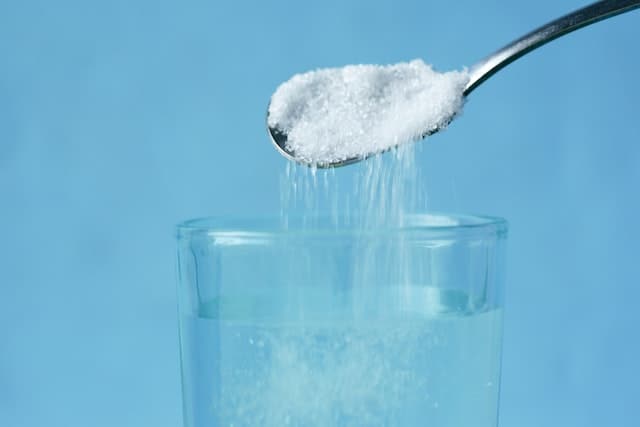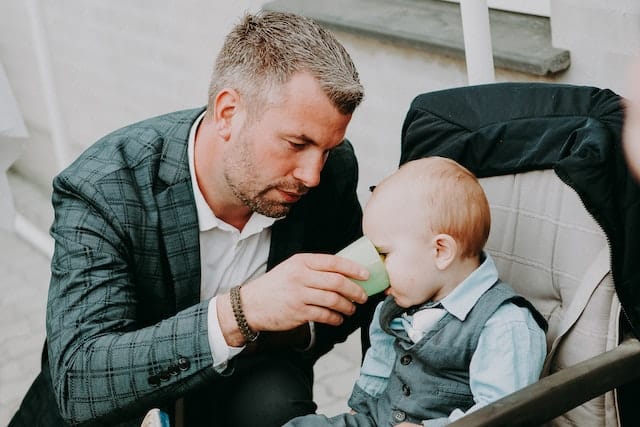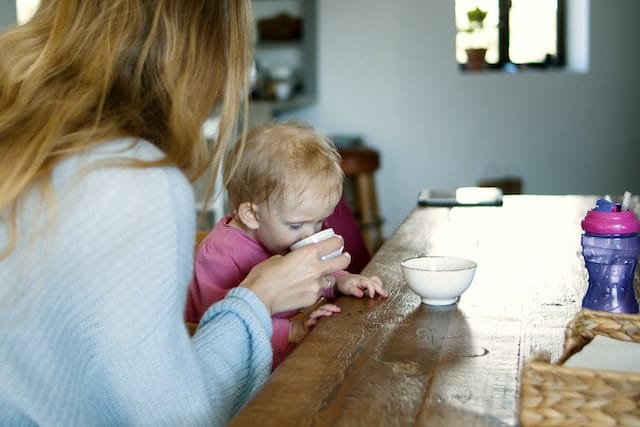Sugar water is a simple solution made from sugar and water that has been used for decades as a remedy for various ailments in babies. It is often given to babies to help soothe them during medical procedures, such as vaccinations or blood tests, or to relieve constipation or dehydration.
While it is not a substitute for breast milk or formula, sugar water can provide a temporary relief for babies in certain situations.
Understanding the proper way to prepare sugar water is crucial for ensuring its effectiveness and safety for babies. The concentration of sugar in the water, as well as the type of sugar used, can affect its potency and potential side effects.
Additionally, the water used to make the solution should be sterile and free of contaminants to prevent any infections or illnesses in babies. This article will provide a step-by-step guide on how to make sugar water for babies, as well as its usage and potential risks.
Key Takeaways
- Sugar water is a simple solution made from sugar and water that can provide temporary relief for babies in certain situations.
- The proper preparation of sugar water is crucial for ensuring its effectiveness and safety for babies.
- Sugar water should not be used as a substitute for breast milk or formula, and consulting with a pediatrician is recommended before administering it to babies.
Understanding Sugar Water
Sugar water is a simple solution made by dissolving sugar in water. It has been used for various purposes, including as a sweetener and a source of energy.
When it comes to babies, sugar water is often used as a quick and easy solution to alleviate pain and discomfort.
Sugar water for babies is a mixture of water and sugar that is given to infants to soothe them during medical procedures or when they are experiencing discomfort. It is commonly used as a non-pharmacological intervention to help manage pain and distress in newborns.
The process of making sugar water for babies is relatively simple. One can make it by mixing a small amount of sugar with water to create a simple syrup.
The ratio of sugar to water can vary depending on the desired concentration. A common ratio is one part sugar to four parts water.
It is important to note that sugar water should not be used as a substitute for breast milk or formula. It should only be used in specific situations when recommended by a healthcare professional. Additionally, excessive use of sugar water can lead to dental problems and other health issues.
In summary, sugar water is a simple solution made by dissolving sugar in water. It is commonly used as a non-pharmacological intervention to help manage pain and distress in newborns.
However, it should only be used in specific situations and under the guidance of a healthcare professional.
Preparation of Sugar Water for Babies
Ingredients Required
To make sugar water for babies, you will need the following ingredients:
- Purified water
- White sugar
It is important to use purified water to ensure that the water is safe for the baby to consume. Boiled water can also be used instead of purified water.
Step by Step Recipe
To prepare sugar water for babies, follow these steps:
- Add one teaspoon of sugar to a pot.
- Add one cup of purified water to the pot.
- Place the pot on the stove and turn the heat to medium.
- Stir the mixture until the sugar dissolves completely.
- Bring the mixture to a boil.
- Once the mixture comes to a boil, turn off the heat and let it cool down.
- Pour the sugar water into a bottle and it is ready to be served to the baby.
It is important to use the ideal ratio of sugar and water to ensure that the sugar water is safe for the baby to consume. The ideal ratio is one teaspoon of sugar per cup of water.
Alternatively, glucose water can be used instead of sugar water. The ideal ratio of glucose water is one teaspoon of glucose per cup of water.
Overall, making sugar water for babies is a simple process that can be done at home with just a few ingredients and some basic kitchen equipment.
Usage of Sugar Water for Babies
Sugar water has been used for decades as a home remedy to soothe babies during painful procedures like vaccinations, blood draws, and circumcision. It is a simple solution of sugar and water that can provide pain relief, hydration, and comfort to babies.
However, it is important to use sugar water in moderation and only under the guidance of a healthcare professional.
Pain Relief
Sugar water has been shown to provide pain relief to babies during stressful moments like vaccinations and blood draws. Sucrose, the sugar found in sugar water, has been found to activate the release of endorphins in the brain, which can help reduce discomfort and pain.
Hydration
Sugar water can be used to provide hydration to babies who are experiencing an upset stomach or are unable to drink breast milk or formula.
However, it is important to note that sugar water should not be used as a replacement for breast milk or formula and should only be used under the guidance of a healthcare professional.
Constipation Relief
Sugar water can also be used to provide relief for babies who are experiencing constipation. The sugar in sugar water can help draw water into the baby’s intestines, making it easier for them to pass stool.
Soothing Effects
In addition to providing pain relief, hydration, and constipation relief, sugar water can also have soothing effects on babies. Skin-to-skin contact, swaddling, and touch are all important ways to soothe babies, and sugar water can be used in conjunction with these methods to help provide additional comfort.
It is important to note that sugar water should not be used as a treatment for hypoglycemia or given to premature babies without the guidance of a healthcare professional.
Additionally, excessive use of sugar water can lead to dental problems and other health issues. Parents should always consult with their healthcare provider before using sugar water for their baby.
Administering Sugar Water
Administering sugar water to babies can be done in different ways. Here are some methods that parents can use to give sugar water to their babies.
Using a Pacifier
Some parents prefer to use a pacifier to give sugar water to their babies. Here are the steps to follow when using a pacifier:
- Dip the pacifier in the sugar water solution.
- Allow the baby to suck on the pacifier.
- Repeat the process until the desired amount of sugar water is consumed.
Using a pacifier is a convenient way to give sugar water to babies who are used to sucking on pacifiers.
Using a Syringe
Another method of administering sugar water to babies is by using a syringe. Here are the steps to follow when using a syringe:
- Fill the syringe with the sugar water solution.
- Gently insert the syringe into the baby’s mouth.
- Slowly administer the sugar water into the baby’s mouth.
- Repeat the process until the desired amount of sugar water is consumed.
Using a syringe is a precise method of giving sugar water to babies, and it allows parents to control the amount of sugar water that the baby consumes.
Using a Dropper
A dropper can also be used to administer sugar water to babies. Here are the steps to follow when using a dropper:
- Fill the dropper with the sugar water solution.
- Place the dropper in the baby’s mouth.
- Squeeze the dropper to administer the sugar water into the baby’s mouth.
- Repeat the process until the desired amount of sugar water is consumed.
Using a dropper is a simple method of giving sugar water to babies, and it can be an effective way to soothe a fussy baby.
When administering sugar water to babies, it is important to use a clean pacifier, syringe, or dropper. Parents should also ensure that the baby is in a comfortable position and that they are not forcing the sugar water into the baby’s mouth.
Also see: How Much Rice Cereal In Bottle
Safety and Risks
When it comes to giving sugar water to babies, there are some potential safety concerns and risks to be aware of. This section will cover some of the most important ones.
Potential Side Effects
While sugar water is generally considered safe for babies when given in small amounts, there are some potential side effects to be aware of.
These can include:
- Diarrhea: Too much sugar can cause diarrhea, which can lead to dehydration and electrolyte imbalances.
- Water intoxication: If a baby drinks too much water, it can dilute the electrolyte balance in their body and lead to water intoxication, which can be life-threatening.
- Tooth decay: Sugar can contribute to tooth decay, especially if it is given frequently or in large amounts.
- Weight gain: Giving a baby too much sugar water can lead to weight gain, which can increase the risk of obesity and other health problems later in life.
When to Avoid Sugar Water
There are some situations in which it is best to avoid giving sugar water to a baby. These include:
- Babies with diabetes: Giving sugar water to a baby with diabetes can cause their blood sugar levels to spike, which can be dangerous.
- Babies with heart disease: Sugar water can put extra strain on the heart, which can be dangerous for babies with heart disease.
- Babies on medication: Some medications can interact with sugar water, so it is best to avoid giving it to babies who are taking medication.
- Babies with electrolyte disturbances: If a baby has an electrolyte imbalance, giving them sugar water can make the problem worse.
It is also important to note that sugar water should never be used as a substitute for breast milk or formula. Babies need the nutrients and hydration provided by breast milk or formula to grow and develop properly.
Overall, while sugar water can be a helpful tool for soothing a fussy baby, it is important to use it safely and in moderation. If you have any concerns or questions, be sure to talk to your pediatrician.
Alternatives to Sugar Water
When it comes to soothing a fussy baby, sugar water has been a go-to remedy for many years. However, there are alternative options available that may be healthier and safer for your baby.
Breastfeeding
Breastfeeding is the most natural and beneficial way to feed your baby, and it can also help soothe a fussy baby. Breast milk is packed with nutrients and antibodies that can boost your baby’s immune system, and it also contains natural sugars that can provide a sweet taste.
Breastfeeding also promotes bonding between mother and baby, which can have a calming effect on both.
Formula Feeding
For mothers who are unable to breastfeed, or choose not to, formula feeding is a safe and healthy alternative to breast milk. Most infant formulas contain a blend of carbohydrates, proteins, and fats, along with vitamins and minerals, to support your baby’s growth and development.
While formula does not contain natural sugars like breast milk, it is a safe and effective way to soothe a fussy baby.
It is important to note that adding salt or sugar to formula or breast milk is not recommended, as it can be harmful to your baby’s health. If you are concerned about your baby’s fussiness, it is always best to consult with your pediatrician to determine the best course of action.
Consulting with a Pediatrician
When it comes to infant feeding, it is always important to consult with a pediatrician before making any changes to the baby’s diet. This is especially true when considering adding sugar water to their diet.
Pediatricians are medical professionals who specialize in the care of infants, children, and adolescents. They have extensive knowledge of infant nutrition and can provide valuable advice on the appropriate use of sugar water for babies.
Consulting with a pediatrician can help ensure that the baby is receiving the appropriate medical care and that any medical procedures or studies are taken into consideration. Additionally, pediatricians can provide guidance on the appropriate use of anesthesia if it is necessary.
It is important to note that while sugar water may be a common home remedy for soothing fussy babies, there is limited medical evidence to support its use. Pediatricians may recommend alternative methods of soothing a fussy baby, such as swaddling, rocking, or using a pacifier.
In summary, consulting with a pediatrician is crucial when considering adding sugar water to a baby’s diet. They can provide valuable medical advice and ensure that the baby is receiving appropriate care.
Conclusion
In conclusion, sugar water can be a helpful home remedy for babies suffering from mild discomfort or dehydration. However, it is important to use it in moderation and not as a substitute for medical treatment if the baby’s condition worsens.
While sugar water has been used as a traditional home remedy for generations, it is important to note that there are alternatives available, such as oral rehydration solutions recommended by healthcare professionals.
These solutions are specifically designed to replenish lost fluids and electrolytes and are safer than sugar water.
When preparing sugar water for babies, it is important to use the correct ratio of sugar to water and to ensure that the water is boiled and cooled before use. Additionally, it is recommended to use plain white sugar rather than honey or other sweeteners to avoid the risk of botulism.
Overall, sugar water can be a helpful solution for mild discomfort or dehydration in babies when used in moderation and as part of a larger treatment plan.
However, it is important to consult a healthcare professional for guidance and to always prioritize the baby’s safety and well-being.
Related post: Can I Mix Baby Cereal With Water
Frequently Asked Questions
How can sugar water help soothe a colicky baby?
Sugar water can help soothe a colicky baby by providing a sweet taste that can distract them from their discomfort. The sugar in the water can also provide a quick source of energy, which can help calm a fussy baby.
What are the potential risks of giving sugar water to a newborn?
There are potential risks associated with giving sugar water to a newborn. Overfeeding can lead to obesity and other health problems later in life. Additionally, sugar water can cause tooth decay and may interfere with breastfeeding.
Are there any benefits to giving sugar water to a baby?
While sugar water may provide temporary relief for a fussy baby, there are no proven benefits to giving sugar water to a baby. In fact, the American Academy of Pediatrics recommends against giving sugar water to babies.
What is the recipe for making sugar water for babies?
To make sugar water for babies, mix one teaspoon of sugar with two ounces of water. It is important to use sterile water and to avoid using too much sugar, as this can cause digestive problems.
Where can I find Sweet-Ease sugar water for babies?
Sweet-Ease sugar water for babies can be found at many baby supply stores, as well as online. However, it is important to note that the American Academy of Pediatrics recommends against giving sugar water to babies.
Is it safe to give toddlers sugar water?
While sugar water may be safe for toddlers in small quantities, it is important to limit their intake of sugary drinks to prevent tooth decay and other health problems. It is recommended that toddlers drink water and milk instead of sugary drinks.

Iesha is a loving mother of 2 beautiful children. She’s an active parent who enjoys indoor and outdoor adventures with her family. Her mission is to share practical and realistic parenting advice to help the parenting community becoming stronger.



